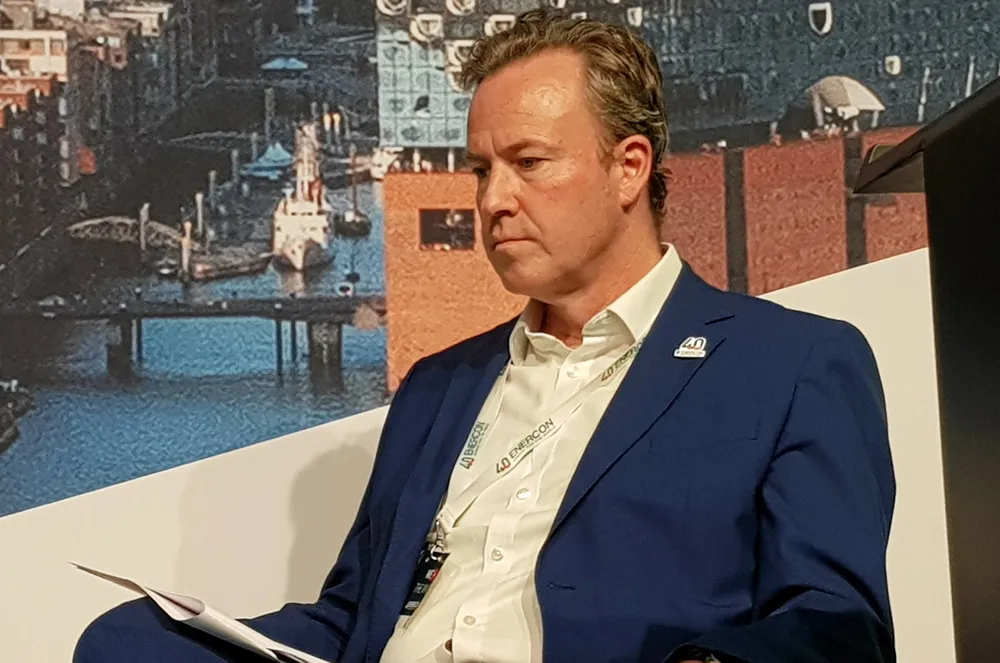EU's Net-Zero Industry Act 'a toothless tiger' says wind turbine group
Enercon COO demands more concrete action to protect Europe’s sector from 'unfair' US and Chinese competition

The EU’s Net-Zero Industry Act (NZIA) currently is “a toothless tiger”, Enercon chief operating officer Ulrich Schulze Südhoff said, demanding more concrete action to protect Europe’s wind industry from “unfair” overseas competition.
“All agree that today's competition is not fair. We have rules, they are somehow twisted. We have a market distortion when you look at the benefits you get out of the [US] inflation reduction act, and also when you look at the different levels of subsidies you get for Chinese production,” Schulze Südhoff said at a panel on the resilience of European OEMs at the WindEnergy Hamburg conference Wednesday.
“The NZIA as it is today is a toothless tiger. It really depends on what the member states are making out of that.”
European societies need to ask themselves, whether they “want to get into the next dependency, on certain components coming out of one part of the world”, or define energy supply as critical infrastructure that it wants to protect, the executive added.
The regulatory framework earlier this year was approved by the European Parliament and the European Council.
The NZIA among other measures seeks to bolster the resilience of European clean tech industries with requirements including pre-qualification criteria and weightings for non-price criteria in renewable energy tenders, but most EU member states still haven’t implemented such measures in national legislation or rules.
Südhoff’s comments came after Enercon CEO Udo Bauer on Tuesday had demanded that Germany’s government should ensure all manufacturers have fair competition and should “punish” unfair prices – a hint at some Chinese OEMs that are offering their wind turbines at levels that are deemed dumping.
Ibrahim Oezarslan, the CEO of the Europe division of fellow German onshore wind OEM Nordex at the same panel Wednesday stressed that regarding the protection of its clean tech industry Europe should be extremely careful not to linger in an attitude of “let’s see what’s going to come, let’s give it time, thing’s are developing.
“I think’s a mistake … unfair competition is already there. Dependency is already there, and to stop it at a certain point, we need to act quickly. I think that’s one of the very crucial mistakes.”
Including non-price criteria is already working well in the Dutch offshore wind tendering system, Vestas’s central and northern Europe chief Nils de Baar said at the same panel, adding that a focus on sustainability in award criteria is an “advantage for us” and would help “to get a return on investments” such as into recycled wind turbine blades or low carbon steel.
Positive view
While the executives at the WindEnergy Hamburg panel discussed ways to boost the resilience of Europe’s wind supply chain, they also were optimistic about the coming years.
“From our market perspective, the overall view is definitely positive. the glass is half full,” de Baar said, pointing to Germany’s recent tendering of 2.7GW of onshore wind en route to awarding 10GW this year alone on land.
“That’s setting an example for a lot of markets,” de Baar said.
“Next to that, we saw a new government in the UK acting immediately by lifting the ban on onshore wind in England.”
The outlook is also “definitely positive” for offshore wind, said Martin Gerhardt, head of offshore product management at Siemens Gamesa.
This year alone, 30GW of new offshore capacity has already been tendered off, with another 10GW to follow, he said, adding that next year’s volumes should be similar.
But until those volumes hit the company’s order books will take some time as offshore lead times are a bit longer, Gerhardt cautioned.
“At the moment, we are doubling the manufacturing capacity in the sector. Of course, we also see challenges in the long run. Governments have been very good at de-bugging bureaucracy, permitting” and raising tendering volumes, he said, but ports and grid infrastructure needed upgrading still.
(Copyright)